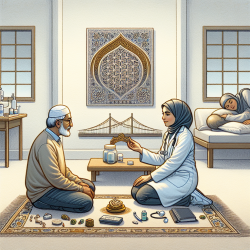Introduction
In an increasingly diverse world, healthcare professionals are often tasked with providing care to patients from various cultural and religious backgrounds. One such group is the Muslim community, which, according to research, faces significant healthcare inequities. The article "Towards a better understanding between non-Muslim primary care clinicians and Muslim patients: A literature review intended to reduce health care inequities in Muslim patients" sheds light on these disparities and offers insights into improving care for Muslim patients.
Understanding Cultural Competence
Cultural competence is crucial in healthcare as it directly impacts the quality of care provided to patients from different backgrounds. For Muslim patients, this means understanding the religious and cultural practices that may influence their healthcare decisions. The literature review emphasizes the importance of non-Muslim clinicians gaining knowledge about Islamic practices, which can help bridge the gap between healthcare providers and Muslim patients.
Key Insights from the Literature Review
- Holistic Care: Muslim patients often prefer a holistic approach to healthcare, which includes spiritual, psychological, and social dimensions. Clinicians should be aware of this preference and incorporate it into their care plans.
- Islamic Practices: Understanding Islamic practices related to health, such as fasting during Ramadan, dietary restrictions, and prayer routines, can enhance the clinician-patient relationship and improve care outcomes.
- Communication: Effective communication is key. Clinicians should use open-ended questions to understand their patients' beliefs and preferences better. This approach fosters trust and encourages patients to share their concerns.
- Gender Sensitivity: In many cases, Muslim patients may prefer healthcare providers of the same gender. Accommodating these preferences can improve patient comfort and satisfaction.
Encouraging Further Research
The literature review highlights the need for further research into healthcare inequities faced by Muslim patients. While the current body of research provides valuable insights, more studies are needed to develop comprehensive strategies that address these disparities effectively. Healthcare professionals are encouraged to engage in research that explores the intersection of religion, culture, and healthcare to better serve diverse patient populations.
Conclusion
Improving healthcare for Muslim patients requires a commitment to cultural competence and ongoing research. By understanding and respecting Islamic practices, healthcare providers can deliver more effective, patient-centered care. This not only benefits Muslim patients but also enriches the healthcare system as a whole by fostering inclusivity and diversity.
To read the original research paper, please follow this link: Towards a better understanding between non-Muslim primary care clinicians and Muslim patients: A literature review intended to reduce health care inequities in Muslim patients.










